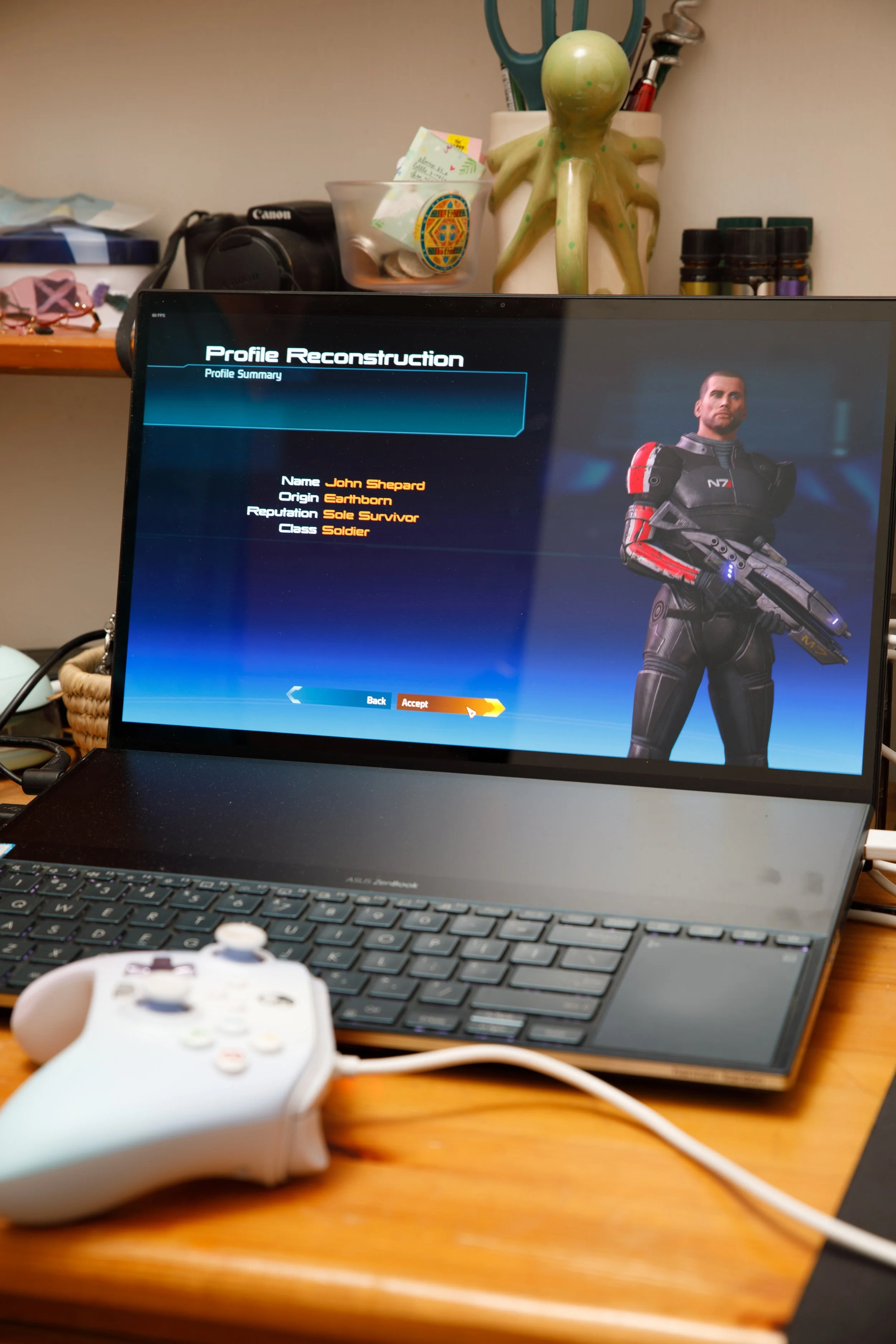South Asian photographer and fashion model Soumyajyoti (SJ) unveils the fascinating story of his global upbringing—spanning continents, cultures, and his unwavering love for games. His unique perspective reveals gaming as more than a hobby, but an art form where storytelling blurs the distinction between creator and consumer. Scroll down to explore the intricacies of his gamer identity, and discover how he champions the diverse unity within the gaming community—an expansive mosaic where fun transcends boundaries.






“If I had an Indian accent, it'd probably deter me from speaking during online matches," 28-year-old South Asian photographer and fashion model Soumyajyoti (SJ), highlights the thorny issue of racism during online gaming, where taunts and slurs are often flung at players with South Asian accents.
His life brings to mind the phrase ‘citizen of the world.’ Born in Mozambique, SJ’s life has been profoundly influenced by his father's service in the Indian Foreign Services, which led to a journey spanning continents and cultures that have left an indelible mark on his character—Turkey, Armenia, Mexico, New Zealand, India—and now London, United Kingdom. His formative years were a perpetual carousel of cultures that shaped his spirit, a life defined by a diverse upbringing and only one constant: video games. SJ is the photographer-collaborator on my 'Diversity in the Game' MA dissertation project. Our connection, however, runs deeper than mere professional collaboration. For over eight years, he has also been my partner, and I find that this conversation unveiled a new lens through which to understand him—an identity woven with threads of global citizenship and an unwavering passion for games. Gaming, to him, isn't just a pastime—it's an art form, a conduit for immersive storytelling where he is not a mere spectator. “I enjoy it more than watching a movie or reading a book because you are an active participant that can influence the outcome," he muses, underscoring his belief in the medium's unique ability to meld creator and consumer.
This passion is not blind to the racism and sexism that mar the gaming community. Although personally spared from the sting of racial insults during gameplay, SJ highlights his revulsion against such behaviour. A multicultural upbringing has left him feeling disconnected from his South Asian-ness, "I haven't really been around my culture a lot or witnessed it much growing up, so I don't really identify with my heritage or anything," he confides. Yet, he acknowledges that this ability to seamlessly blend, and oftentimes pass off as racially ambiguous might have shielded him from the barrage of toxicity hurled at South Asians during gameplay. "If you're playing on a North American, European, or Australian server, and people find out you're South Asian, they'd probably ask really stereotypical stuff or make super racist remarks like 'you probably smell like curry' or 'your dad probably works at a grocery store or is a taxi driver'." While he acknowledges the strides toward inclusivity in online gaming spaces over the years, he harks back to a period around 2008-2009 when discriminatory attitudes ran especially rampant.
“Also, if they figured out you were a girl, they would like verbally sexually assault you." He unveils another facet of inequality embedded in the gaming world. Growing up, gaming was often seen as a male-centric activity. "If it was just the guys, we'd be playing games, but if there were girls, we wouldn't play games, we'd watch movies or go hang out at the mall instead," he recalls. However, he attests to the growing presence of female gamers, noting that when he played Rainbow Six Siege during the Covid-19 pandemic, there was a noticeable increase in female players. He is quite an optimist about positive changes brewing within the industry, calling out initiatives like automatic word bans for slurs and offensive language to curb toxic behaviour.
Amid these broader issues, SJ's love for gaming remains unwavering as his preferred form of media consumption. He navigates his hobby alongside a full-time job, carving out nightly hours for play and indulging on weekends in an eclectic array of genres. The names that roll off his tongue are a symphony of possibilities, "Assassin's Creed or all the Tom Clancy games, Metal Gear Solid, Mass Effect, Total War, Fallout, Civilization, Age of Empires, City Skylines, Sim City, the Sims, all the Star Wars games." He holds a special affinity towards PC games due to their versatility and adaptability. “You can play with a mouse & keyboard or a controller, a big screen or a small screen. You’re also not stuck in one place like with most of the consoles (except the Nintendo Switch). You have options to play on the move now as well with the Steam deck.”
Game titles like Civilization, Age of Empires, and The Total War Series hold a special allure for SJ, as he finds immense pleasure in politics, diplomacy-themed strategies, and games centred around empire and city building. Reflecting on his entry into the Total War series, he unveils his fascination with history and the prospect of reshaping its course. Role-playing games (RPGs) with strategic elements, such as the X series (X4 & X3), also command his attention. Among his favourite games, Mass Effect takes a prominent place, and despite having played it more than 150 times, he still remembers all the lines and intricacies of its story.. SJ describes it with animated detail, revealing his deep connection to the game's universe which is set in the distant future. His fascination with history extends beyond the confines of the real world; he eagerly explores fictional narratives that offer insights into the potential evolution of science and society. In Mass Effect, players step into the shoes of Commander Shepherd, a decorated human soldier who must stop a rogue agent from carrying out a galactic invasion. SJ's face lights up as he mentions the character's name, a testament to his emotional connection, a connection that runs deeper than the character's interstellar adventures. It is grounded in the fact that Shepherd exists in a time when racial boundaries and national borders have dissolved. As an individual shaped by diverse cultures from around the world, SJ identifies with Shepherd's role as an Earth-based entity, transcending the constraints of geographical identities. This unique resonance reaffirms the idea that individuals often seek relatable reflections of themselves or aspirational figures in the media they consume.
But how did SJ’s gamer journey begin? His initiation occurred at the age of three, fingers gripping a Nintendo 64 controller, plunging him into the worlds of Mario Bros and Duck Hunt. The trajectory continued with his family's first home computer in 1999, featuring FIFA 99 and the DK History Explorer. Elaborating on the latter, he clarifies that it was more of an interactive online encyclopedia than a true game, a distinction drawn from his belief that a game involves user input that affects the unfolding story. A few years later, a Sega Mega Drive graced his Christmas, offering him the chance to play Rambo and Sonic games.
His narrative further unfolds against the backdrop of international schools, where a diverse group of peers, predominantly American, shared his passion for video games. "They generally had so much stuff," he adds, alluding to the access to gaming consoles and the latest releases, which inspired him to ask his parents for those things as well. By 2002, he got his first Playstation and played titles like Planet of the Apes and Ace Combat on it. This phase coincided with his time in Armenia, where SJ's school designated times for computer gameplay, and access to coveted titles like Grand Theft Auto (GTA) was a privilege determined by luck. Within this environment, SJ discovered a 1940s-based Titanic game, a captivating blend of history and interactivity that left an indelible mark. Gaming also served as a conduit for socialization, with post-school afternoons spent playing Mario Kart races, GTA Vice City, Halo, and Call of Duty (COD) with friends.
He moved to India for a year and a half of boarding school in 2005, a period where video games were "pretty much nonexistent." The strict environment, coupled with limited access to technology, diverted the focus towards sports rather than screens. Mexico, however, rekindled his gaming spirit, where a thriving gaming culture greeted him, marked by Xboxes, PlayStations, and vibrant titles like Halo, COD, and Smash Bros. Gaming cafes in New Zealand further enriched his experience. However, when he moved back to India in 2012, the gaming scene in India had undergone a significant transformation. During weekends, SJ and his friends would band together, determined to overcome hostel Wi-Fi restrictions that blocked games. Their solution? Hotspotting their phones to play MOBAs like League of Legends and DOTA on their laptops. "I would’ve eventually played games anyway because I went to university in India, and people played games." Yet, he acknowledges that his journey might have charted a different course. The gaming landscape he envisages in India during his formative years stands distinct from his own. "They probably didn’t have the same experiences with games that I did growing up, because I don’t know many people in India who grew up with Playstations or Xboxes as a kid. Now they do. I don’t think any of my university friends had Xboxes or Playstations but rather played hugely popular mainstream PC games like FIFA, Call of Duty (COD), Grand Theft Auto (GTA), or Age of Empires on their computers, but I don’t think gaming culture was a huge thing.” He introduced his friends to game franchises like Rainbow Six, Mass Effect, Civilization, and Fallout, which they have grown to love.
While he may have immersed himself in more games than many, SJ’s self-identity as a gamer has undergone an evolution. "Now I do, but while growing up I didn't think of myself as a gamer. I wouldn't say I'm a hardcore gamer though as I play games casually." When queried about the compatibility of a hardcore gamer label with the term "true gamer," his response is swift: "No, anyone who plays is a true gamer. Anyone who plays any game is a gamer." This stance, however, diverges from the prevailing outlook within the gaming community. He underlines the divisions that persist between console gamers and PC gamers, each harbouring their own sense of superiority. The advent of cross-platform gaming, where console and PC enthusiasts unite, has bridged some divides, yet mobile gamers remain somewhat marginalised. Personal preference tips the scales toward PC games for SJ, although he harbours a soft spot for mobile gaming as well through the mobile versions of titles like League of Legends, PUBG, or COD.
SJ deftly challenges stereotypes that have long plagued the perception of gamers. “I don’t think I’ve ever met anyone who is like the stereotypical image of a gamer. People generally tend to think gamers are fat, pale basement-dwelling guys who don’t touch grass, don’t have basic hygiene, miss school and homework and don’t know how to interact with people.” He counters this stereotype, recalling friends who defied these labels with their athleticism and dynamic personalities, a stark reminder that gamers come from all walks of life. Observing the tapestry of the gaming community, SJ recognises its diversity that spans continents and socioeconomic circumstances. "You will find gamers in every country. We come in all shapes and sizes," he reflects. His words resonate—the gaming community stands as a testament to unity in diversity, a sprawling mosaic where fun transcends borders and boundaries.